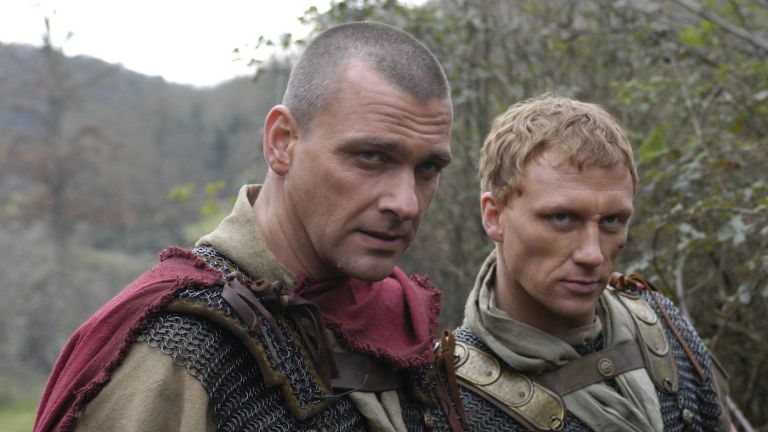HBO’s Rome Ending Was Originally Very Different
Almost 10 years after its finale, Ray Stevenson revealed what the original Rome ending and final Titus Pullo scene was supposed to be.

Before there was Spartacus or The Tudors, Vikings or The Borgias—before Game of Thrones—there was Rome. As the first salvo of a legion of period epics and historic fictions on premium cable, Rome was one of the most ambitious gambles ever ventured by HBO with a first season cost that was upwards of $100 million due to pricy sets (the biggest in the world), principal photography in Italy, and the usage of old fashioned 35mm cameras.
The series proudly attempted to tell a sort of an “Upstairs, Downstairs” drama between Rome’s patrician class and its plebian underbelly, making it something of a semi-prequel to I, Claudius as we witnessed the rise and fall of Gaius Julius Caesar (Ciaran Hinds), and then the many years of warfare between the various parties in the wake of his death—including a young Octavian (first Max Pirkis, then Simon Woods)—as well as Rome’s transition from republic to empire.
It was a grand effort… perhaps too much so. Indeed, the popular cult series only ran for two seasons, abruptly ending 10 years ago in 2007. While there was some second-guessing and regret after the ratings for Rome season 2 increased, the die was already cast and that season concluded the story with Octavian becoming Augustus, the first Emperor of Rome, and his quiet plebian right-hand, Titus Pullo (Ray Stevenson), taking on the responsibilities of raising a son since his best mate Lucius Vorenus (Kevin McKidd) lies presumably in the grave.
Yet, this was not the original ending in mind. Rome creator Bruno Heller has previously hinted he envisioned the series going for four or fives seasons, following Vorneus and Pullo to Galilee and beyond. And when we talked to actor Ray Stevenson late last year, he revealed the final grim direction the series would have headed in.
Stevenson was chatting with us before the premire of Black Sails season 3, where he would play the notorious pirate captain, Blackbeard. But as the conversation turned to Rome, and I brought up the potential Galilee continuation of Pullo’s journey, Stevenson revealed what had once been intended to be the very first scene of Rome—as well as the series’ “ultimate end.” The point that Heller and Stevenson always saw the series building toward.
“Bruno [Heller] once did outline a story that he was going to start the whole series with,” Stevenson said. “An 88-year-old Pullo going down to the riverside by Vorenus’ tomb, or sarcophagus, pouring wine on it, taking a sword out while sitting there on the banks, looking at the glistening river, and committing suicide.
“And as he has his face hit the sand on the banks, a fish jumped out of the water, and the silver light on the fish caught the sword, which brought us right into that first battle with Lucius Vorenus and [Titus Pullo] where he breaks ranks.”
As according to Stevenson, the final scenes of the series would have eventually explained this fate as the relationship between Octavian, who is only a child when Rome starts, and Pullo becomes clear.
Says Stevenson, “The reason was that the only person on the planet who [knows] the Emperor Augustus to be human, who was Octavian, is Pullo. And Pullo’s the only one who has that memory of him or that life. And basically, [Augustus] asks him to. Nobody else could kill him. But at that stage, Octavian is obviously in his paranoid imperial sort of thing, and Pullo is the last tie to that time when he was a boy. It’s genius.”
Even though this sequence was obviously cut from what became the eventual Rome pilot, this was apparently the ending that Heller always had in mind, and where the series would have eventually built to if it had been allowed to move on past Antony and Cleopatra, and into the actual era of Pax Romana—not to mention the New Testament.
“But they didn’t want to shoot it because they didn’t want to give the ultimate, ultimate, ultimate end away,” Stevenson said. “But it was a genius way of going. I mean Bruno’s mind is just—well Bruno Heller, he’s brilliant.”
It is a shame that we never were able to cross the narrative Rubicon that far into the original vision for the series. Still, with every other show seeming to come back these days, hope might spring eternal for those who’ve pledged allegiance to the 13th Legion.
This story originally published on Jan. 18, 2016.
